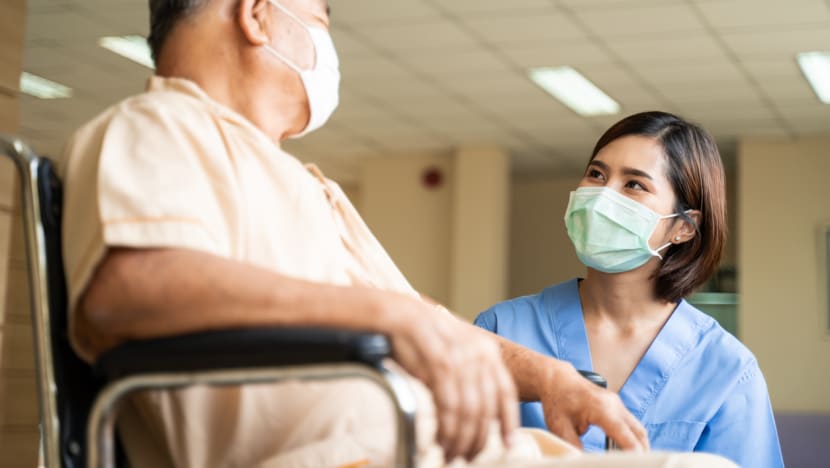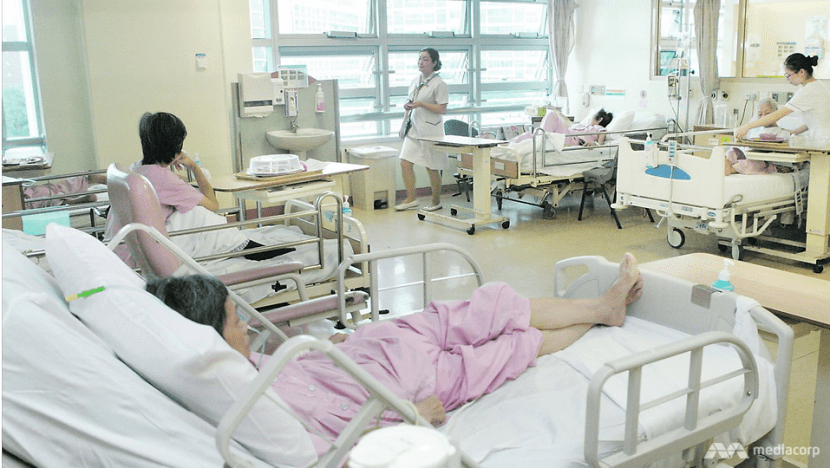Commentary: Are we adequately preparing future nurses for the evolving healthcare landscape?
Besides recruiting and retaining nurses, we must also look at training as patient needs change and the healthcare system gets more complex, say Lydia Lau and Darryl Ang from the Alice Lee Centre for Nursing Studies at the National University of Singapore.


This audio is generated by an AI tool.
SINGAPORE: My (Darryl) first patient resuscitation as a new nurse in 2016 was nothing like the exercises I experienced as an undergraduate, and even less like the chaotic scenes from popular TV dramas.
“Call the ICU and prepare for the transfer. We will take care of this,” instructed the senior nurse. Things were calm, precise but still stressful. The sense of responsibility and the quick actions required were overwhelming.
A local study released in April found that more than half of nurses with less than two years’ experience are uncomfortable with independently performing more complex procedures. These include responding to a critical clinical emergency and handling for chest tubes.
While new graduate nurses may be well-versed in anatomy, pathophysiology, pharmacology, and nursing sciences, the realities of patient care can be remarkably different.
Nurses are the backbone of any health system - and updated strategies to recruit and retain them have become crucial in Singapore. But there’s one more dimension to consider: How can we better train future nurses and equip them with the skills to navigate an evolving healthcare landscape?
CONTINUED HONING OF CLINICAL COMPETENCIES
Practical skills are one thing: Patients’ needs will only become more diverse in the coming years as Singapore’s population ages and medical advances improve our understanding and ability to diagnose and treat conditions. There’s a push for more multi-disciplinary and coordinated care, and the healthcare system will also get increasingly complex.
Simulations have become important in many nursing schools to provide experiential learning, an approach using role-play practice in a realistic environment, either with manikins or standardised patients. With technological advancement, schools have also employed more virtual simulations.
Take inserting intravenous and urinary catheters for example. These are very common nursing procedures, and the integration of head-mounted virtual-reality based simulations have provided students with the opportunity to practise these skills repeatedly even outside of class.
However, simulation is meant to bridge a gap between textbook and practice, not to replace learning in clinical settings.
During clinical attachments, a team of nurse educators and clinical instructors provide nursing students with “just-in-time” learning opportunities, where they focus on knowledge and skills specifically relevant to the dynamic conditions of real patients encountered.
Students can also work alongside a nurse preceptor during their clinical attachments. These experienced nurses are typically involved in direct patient care, making them well-suited to guide students in developing clinical skills and reasoning, and to assess their clinical competence.
Beyond clinical and technical competencies, we cannot ignore the importance of building cognitive skills such as critical thinking. Working in a highly complex and dynamic environment, nurses need to continuously adapt and apply their theoretical knowledge appropriately within the clinical context.
Here’s an example of how theoretical knowledge, critical thinking and clinical experience come together: Textbooks say the use of alcohol-based mouth washes is important in oral care, but this was not practiced in the oncology ward I (Darryl) was posted to. The preceptor explained that alcohol-based mouth wash may cause dryness and lead to broken skin in the mouth. Infections may then occur, and these can be deadly for immunocompromised cancer patients.
Educators and practitioners also work together to ensure academic-clinical alignment and that classrooms will always reflect real life. This will be all the more critical as patient needs evolve.
By the time nursing students reach the end of their practical training, they are expected and trusted to complete professional tasks with little supervision. They also learn to manage multiple clinical priorities and perform complex procedures with a steep learning curve that continues on the job.

RESILIENCE AND OTHER SOFT SKILLS
Then there are the soft skills beyond clinical competency. Nursing students also learn to attend to deteriorating patients, relatives and those at the end of life - heightened negative emotions such as anger and grief can be quite common.
A particularly memorable case for me (Darryl) was the death of my first patient, Mr W, who passed on peacefully in the morning, without his close-knit family by his side. The family members were devastated that they did not witness his last moments. What struck me most was an innocent question from his grandson: “Why is Gong Gong not opening his eyes?” It’s not easy for nurses to regularly face such grief without affecting their own well-being.
Resilience is a crucial non-cognitive skill that nurses need to overcome these challenges. Nurses who do not practise self-care cannot provide high-quality care for their patients.
Nursing schools have to prioritise the development of non-cognitive skills, designing programmes to support their mental wellness and transition to clinical practice.
Hospitals worldwide have also introduced graduate nurse residency programmes to support new nurses. A recent published study found that new nurses in the National University Hospital (NUH) benefited greatly from a formal transition programme, with a more structured onboarding process including dedicated nurse mentors. This nurturing and supportive relationship not only fosters emotional agility but also helps build confidence and competence.
LIFELONG LEARNING
In healthcare, lifelong learning must be more than a mantra.
The Singapore Nursing Board mandates that all nurses remain current and updated through continuous professional education. To achieve this, nurses undergo a series of learning activities, yearly skills assessments and upskilling through formal programmes.
As nurses progress in their careers, they return to nursing schools to deepen their expertise and knowledge through post-registration or postgraduate programmes in specialities such as community health, and critical care.
Nurses are an essential part of our healthcare system. Ensuring they are equipped with the technical and critical thinking skills to care for others and the soft skills to care for themselves will only come into sharper focus as patient needs and the healthcare landscape evolve. All of us and our loved ones will depend on it.
Associate Professor Lau Siew Tiang Lydia is Director of Education, Undergraduate Programmes at the Alice Lee Centre for Nursing Studies at the NUS Yong Loo Lin School of Medicine (NUS Nursing), and Dr Ang Wei How Darryl is Research Fellow at NUS Nursing.




















